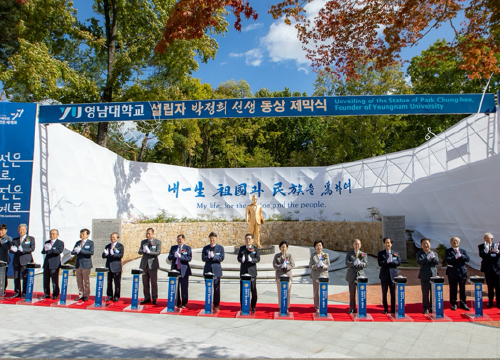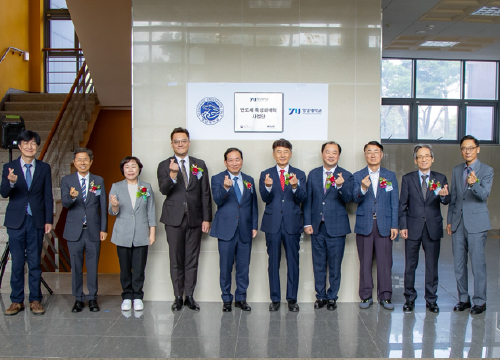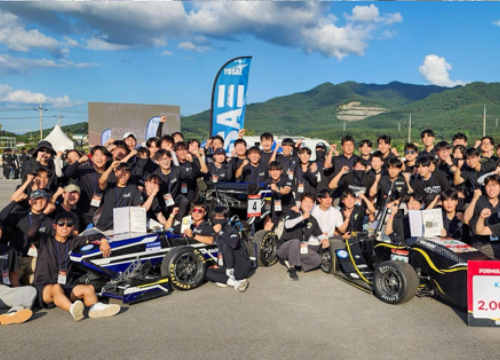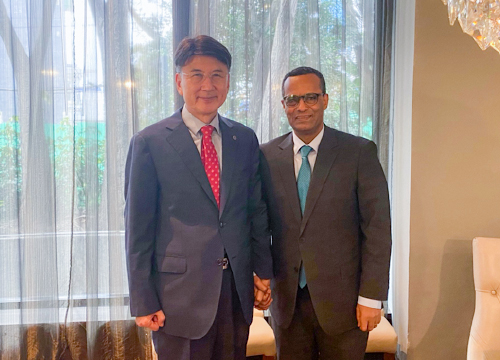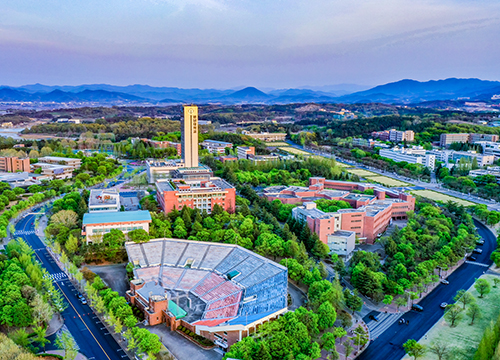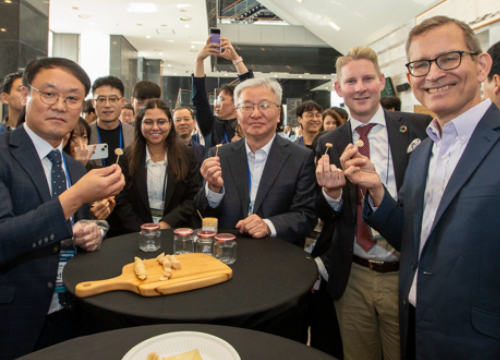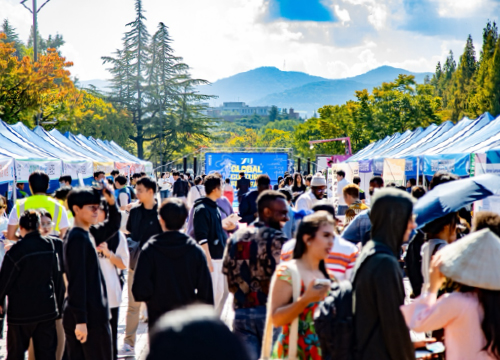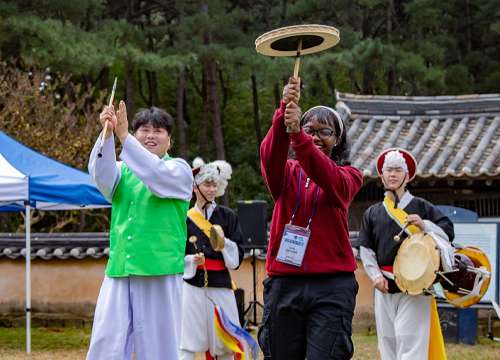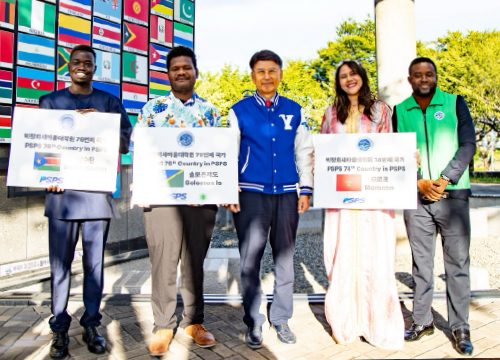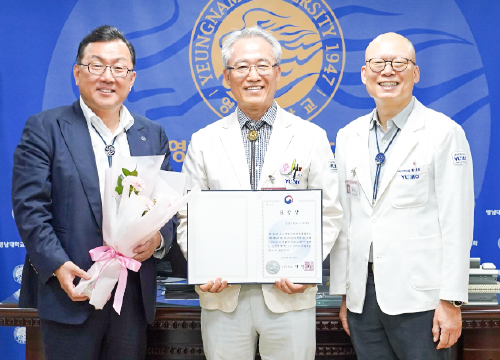-
Over 200 Guests Gather at YU’s Cheonma Honors Park for the 77th Founding Anniversary Statue Unveiling on the 23rd Active USA Chairman LEE Don Donates Full Costs for Statue Honoring YU Founder Park Chung Hee President CHOI Oe-chool: “Honoring the Founder’s Vision, We Will Nurture Talent to Contribute to Global Prosperity” [October 23, 2024] To mark its 77th founding anniversary, Yeungnam University (President CHOI Oe-chool) held a statue unveiling ceremony for its founder, Park Chung Hee, on the 23rd at Cheonma Honors Park. The ceremony was organized to honor the founding spirit, educational philosophy, and achievements of Park Chung Hee while commemorating YU’s 77th anniversary to pass down his legacy to future generations. The event was attended by a distinguished gathering of over 200 guests, including YU President CHOI Oe-chool and faculty; Chairperson HAN Jae-sook of the Yeungnam School Corporation; Chairman of YU's North American Alumni Association LEE Don, who donated all expenses for the statue, along with his spouse, YOO Bok-kyung; former Presidential Secretary for Legal Affairs and first Chair of the Park Chung Hee Memorial Foundation, KIM Ki-choon; Chairman of the Saemaul Foundation, LEE Seung-jong; former YU Presidents LEE Sang-chun and SUR Gil-soo; Kumo National Institute of Technology President KWAK Ho-sang; Yeungnam College of Science and Technology President LEE Jae-yong; former Alumni Association President JEONG Tae-il; Seoul Alumni Association President PARK Jeong-kwan; Honorary Professors’ Association President LEE Gwang-sik; Professor Association Chair JEONG Jae-hak; staff union representatives; student representatives; and retired faculty representatives. The unveiling ceremony proceeded with an opening declaration, an introduction of the founder, a report on the statue’s development, congratulatory addresses, presentation of an appreciation plaque, and the statue unveiling. <YU President CHOI Oe-chool delivering a commemorative speech at the statue unveiling ceremony for Founder Park Chung Hee.> Park Chung Hee, YU founder, was born in Gumi, Gyeongsangbuk-do, in 1917. After serving as a teacher at Mungyeong Public School, he graduated in 1946 from the Chosun Military Academy, the precursor to the current Korea Military Academy. Serving as Korea’s 5th to 9th president from 1963 to 1979, he presented Koreans with a grand vision for national modernization and progress, channeling the collective strength and unity of the people to help South Korea emerge as an economic powerhouse. In 1967, with a commitment to fostering talents essential for national prosperity and progress, he founded Yeungnam University, establishing its educational mission rooted in patriotism and a philosophy of public service. The statue of Park Chung Hee stands on a granite base measuring 2 meters by 2 meters and 0.3 meters high, with the statue itself crafted in bronze, measuring 2.5 meters tall and 0.8 meters wide. Created by artist KIM Young-won, renowned for works such as the King Sejong statue at Gwanghwamun Square and “Osu” housed at Hoam Art Museum, he is a master of Korean figurative sculpture. KIM also produced statues of President Park at his birthplace in Gumi and at Cheongnamdae. In October 2023, during the 9th Annual General Meeting of YU’s North American Alumni Association in Los Angeles, a consensus was reached to create a statue of the founder. In December of the same year, LEE Don, Chairman of the North American Alumni Association, met with YU President CHOI Oe-chool to discuss details, leading to the statue's formal development. In April of this year, Chairman LEE generously donated the entire cost needed for creating and installing the statue to YU, aiming to commemorate the founder’s noble vision and elevate his alma mater’s prestige on its 77th anniversary in 2024. LEE Don (Architecture, Class of '73), who funded the statue entirely, immigrated to the U.S. in 1986 and founded Active U.S.A. Inc. the following year, achieving remarkable success. Despite losing his entire fortune in the 1992 L.A. Riots, he rebounded, thanks to his reputation and leadership as a businessman. He currently serves as a director of Pacific Bank, a prominent Korean-American bank, as well as a leading CEO in the World Korean Business Convention, director of the Memorial Foundation for Scholar LEE Eon-jeok, Gyeongsangbuk-do Overseas Advisory Committee member, and chairman of the Daegu-Gyeongbuk Alumni Association in North America. Even while residing overseas, LEE has made ongoing charitable contributions, becoming the third overseas member of the Honor Society by the Community Chest of Korea for “Fruit of Love.” As an advisor to Gyeongsangbuk-do, he has also extended invitations to more than 100 university students from YU and the Daegu-Gyeongbuk region to join Active U.S.A. as interns, actively supporting young talent in building global competencies. Chairman LEE has been supporting students with foundation of Wolsan Scholarship Society after donating scholarship funds to YU, his alma mater, in 2012 in order to repay the kindness of his father who passed in July 2011, and his mother. Since then, his scholarship donations to YU have amounted to $4 million, making it the largest individual scholarship fund managed by the university. The students of Wolsan Scholarship Society are active in all walks of life, including lawyers, prosecutors, certified public accountants, architects, and teachers. Chairman LEE has been continuously making donations for Wolsan Scholarship Society, university development fund, and Alumni Association Scholarship Fund and has been making large contributions in the university and the alumni association. Chairman LEE also led the founding of the North American Alumni Association for YU, the first of its kind among universities south of the Hangang River. In his role as the head of the preparatory committee, he visited major cities across the United States, encouraging alumni participation and support. Following his tenure as president of the YU LA Alumni Association, he served as the first president of the North American Alumni Association and currently holds the position as its 9th president. YU has recognized his achievements with the “Proud YU Alumnus Award” in 2006 and an honorary Doctorate in Business Administration in 2014. In 2023, he was further honored with the National Order of Civil Merit (Dongbeak Medal) from the South Korean government for his contributions to the field of education. In her congratulatory speech, HAN Jae-sook, Chairperson of Yeungnam School Corporation, stated, “Following the educational ideals of our founder, President Park Chung Hee, YU has produced countless talents who have contributed to national development. I sincerely hope today’s unveiling will inspire us to continue working together to advance YU’s mission and growth.” KIM Ki-chun, former Chief Presidential Secretary to President PARK Geun-hye, shared his reflections: “On the 77th anniversary of YU’s founding, it is profoundly meaningful to hold the statue unveiling ceremony for President Park Chung Hee. I vividly remember his tireless efforts, driven by a singular determination to uplift the nation, which he exemplified as a public servant in the Blue House. Today, we honor his work in laying the foundation of freedom and prosperity that we enjoy.” Next, honorary professor LEE Kwang-sik expressed his gratitude in his address: “I extend my thanks to all those who contributed to the statue of President Park Chung Hee. YU, founded under the exceptional leadership of President Park to lead Korea’s development, has grown alongside the nation. I hope this statue will inspire future generations to honor the founder’s vision and contribute to the country’s progress.” <Chairman LEE Don delivering a congratulatory address at the unveiling ceremony for Founder Park Chung Hee's statue.> Lastly, LEE Don, who played a pivotal role in the creation of the founder’s statue, shared in his address, “It brings me great joy and honor to contribute to erecting the statue of President Park Chung Hee, founder of our alma mater and architect of the ‘Miracle on the Hangang River,’ here on our campus.” He continued, “Establishing a statue of our esteemed founder, President Park, on the YU campus—where the indomitable spirit of Cheonma stands tall—has long been a shared aspiration of YU alumni across North America.” Today, Korea’s standing in the world is unparalleled, a testament to President Park’s patriotic spirit, New Village Movement, and visionary leadership. The North American Alumni Association will forever remember the legacy of President Park, who was instrumental in Korea’s rise as an economic powerhouse.” YU President CHOI Oe-chool said, “It is a moving experience to unveil the statue of President Park Chung Hee, who established YU to nurture the country’s future leaders at a time marked by poverty and uncertainty, in this significant year marking YU's 77th anniversary. Recently, a Nobel Laureate in Economics praised the ‘Park Chung Hee Development Model’ for inspiring economic growth policies globally—a source of pride for us all. Commemorating the founder’s philosophy and vision, while striving to uphold his spirit, is central to YU’s identity.” He continued, “As expressed in our university anthem—‘To dispel darkness and falsehood, teaching brightness and truth’—YU is committed to fulfilling its mission as an institution dedicated to truth and justice. We will stand firm against any forces that challenge our founding principles and identity, upholding the light of true knowledge. I extend my heartfelt thanks to Chairman LEE Don and his family, our North American alumni, and everyone here today. YU will continue to cultivate talents who contribute not only to national prosperity but to the shared welfare of humanity.”
- PR team
- 2024. 11. 07
- 2024. 10. 23
- 466
-
On the 8th, YU Hosts Semiconductor Specialization University Project Launch Ceremony at CRC Over 23 Billion KRW to be Invested in Semiconductor Specialization Support Programs Expansion in Developing Next-Generation Semiconductor Industry and Workforce [October 22, 2024] <The launch ceremony for the 'Semiconductor Specialization University Project' took place on the afternoon of the 8th at YU's CRC.> Yeungnam University (YU), led by President CHOI Oe-chool, is intensifying its efforts in the 'Semiconductor Specialization University Project.' On the afternoon of the 8th, YU held a launch ceremony for the 'Semiconductor Specialization University Project' at its Center for Research Complex (CRC), with YU President CHOI Oe-chool, Project Director KIM Jong-soo, and Deputy Director PARK Si-hyeon in attendance. Joining them were officials from the National Kumoh Institute of Technology (KIT), including KIT President KWAK Ho-sang and Project Director LEE Sang-hyo, as well as representatives from Gyeongsangbuk-do Province, Gyeongsan City, and Gyeongbuk Technopark. The 'Semiconductor Specialization University Project' has been driven by the Center for Advanced Semiconductor Convergence Technology (CASCT), an essential part of YU’s mission. The center traces its origins to the Ministry of Knowledge Economy’s 2009 LED-IT Convergence Industrialization Research Center project, which brought in 40 billion KRW to build a comprehensive semiconductor fabrication facility (FAB) spanning 390 pyeong. Since then, ongoing government and local funding, including the 2023 Ministry of Education’s Regional University Activation Project in the semiconductor field and the Gyeongsangbuk-do Advanced Semiconductor Talent Development Program, have propelled CASCT's development. <From the left, fifth in line, KIT President KWAK Ho-sang, YU President CHOI Oe-chool.> In July, YU was selected for the Ministry of Education and the Korea Institute for Advancement of Technology’s Semiconductor Specialization University Support Program, in partnership with KIT, in the ‘Non-Metropolitan Co-Growth Type’ category. The project, running through 2028 for up to four years (2+2 years), will receive 28 billion KRW in national funding (with an estimated total project cost of 30.1 billion KRW, including local and university funds). The implementation of this project aims to: ▲Establish a regional semiconductor specialization university based on university-industry collaboration, thereby creating a talent cultivation and supply system for leading the next-generation mobility semiconductor (WBG, sensors, systems) industry. ▲Combine YU's strengths in device and process development with KIT's strengths in materials, components, and equipment, reflecting industry demands to drive the semiconductor sector. ▲Train practical personnel for the entire lifecycle of next-generation mobility semiconductors and establish a robust industry-academia cooperation system. Additionally, YU recently became the sole university selected for the Ministry of Science and ICT’s Next-Gen Semiconductor R&D Infrastructure Project, securing 14.95 billion KRW in funding over five years. KIM Jong-soo, Head of the YU Semiconductor Specialization University Project (Professor of Physics), remarked, “With today’s ceremony, the Semiconductor Specialization University project is set to commence full-scale operations and will become a hub for next-generation semiconductor research and talent cultivation.” He added, “We will strive to ensure that the YU Semiconductor Device and Process Center establishes itself as a global center for research and education, extending beyond our region.”
- PR team
- 2024. 11. 07
- 2024. 10. 22
- 430
-
YUSAE Student Auto Club Takes Gold in Formula Division Cheonma DM Team Earns Silver in Formula EV Division, Demonstrating Exceptional Skill Students Design and Build Cars Using Classroom Knowledge [October 30, 2024] <YU’s student auto club members who excelled in the 2024 Student Formula Competition> Students from YU’s student auto club showcased their talent by winning two major awards at the 2024 Student Formula Competition. The spotlight was on YU’s student auto clubs ‘YUSAE’ (mentored by Professors JUNG Young-hoon and KANG Seok-won from the School of Future Automotive Engineering) and ‘Cheonma DM’ (mentored by Professor YOO Gi-soo from the School of Mechanical Engineering). The YUSAE team clinched the gold in the Formula Division, while the Cheonma DM team took silver in the Formula EV Division, validating their skills honed through rigorous preparation. < YU’s YUSAE team’s Formula car racing on the track> Jointly organized by the Korean Society of Automotive Engineers and the Korea Automotive Technology Institute, the competition took place over three days from September 27 to 29 at the E-Mobility Research Center in Yeonggwang, Jeollanam-do. Now in its 18th year since its 2007 launch, this year’s event saw participation from 54 teams representing 40 universities across Korea and two international universities, all competing with vehicles they designed and built themselves. In the Formula Division, teams advanced through vehicle and safety inspections (covering noise, rain, brake, and tilt tests), and were evaluated in acceleration, skid pad, autocross-gymkhana, and endurance racing. YU’s YUSAE and Cheonma DM teams continue to distinguish themselves in the student automotive arena, having achieved top honors in previous competitions, including the International Student Formula Competition hosted at YU. <Team YUSAE (left), winner of the gold medal in the Formula category, and Team Cheonma DM (right), winner of the silver medal in the Formula EV category> YUSAE team leader LEE Jae-hyun (4th-year, School of Future Automotive Engineering) expressed his excitement, stating, “Although the preparation period was challenging, I am thrilled to have competed against other university teams with a car we designed and built from scratch based on our classroom learning. We’ll aim to create an even better vehicle to achieve great results in next year’s competition.” Professor JUNG Young-hoon from YU’s School of Future Automotive Engineering remarked, “The students gained invaluable experience from designing to manufacturing their own car and driving it on the track. Competing in the event helped them apply theoretical knowledge practically, a significant experience that will serve them well in their careers.”
- PR team
- 2024. 11. 07
- 2024. 10. 30
- 416
-
YU President CHOI Oe-chool Pledges Saemaul Studies Partnership with Addis Ababa University Ethiopian Deputy Minister of Education Recommends Expanding Saemaul Studies to Additional Universities Federal Civil Service Commissioner of Ethiopia Invites President CHOI Oe-chool to Civil Service Innovation Workshop Contributing to Korean National Image and Global Trust in Korean Products Through Public Diplomacy [November 1, 2024] <MOU Signing Ceremony with Addis Ababa University (YU President CHOI Oe-chool on the right)> YU President Choi Oe-chool recently visited Ethiopia and signed a memorandum of understanding (MOU) with Addis Ababa University (President Samuel), solidifying a commitment to share insights from Korea’s Saemaul Undong (New Village Movement) for rural development. The partnership aims to cultivate Saemaul experts in Ethiopia through higher education by sharing the principles, key factors of success, and values behind Korea’s transformative movement. The signing ceremony was attended by the Counselor of the Korean Embassy in Ethiopia, who expressed support for the collaboration's progress. As part of the MOU, YU will work with Addis Ababa University’s College of Development to establish a Saemaul Studies program, alongside a Saemaul Movement Center to conduct research and training focused on local adaptation of Saemaul principles. President CHOI stated, “Ethiopia is a ‘brother nation’ that sacrificed for Korea’s freedom over 70 years ago, and I believe that Koreans hold a historic responsibility to give back. Through academic exchange of Saemaul Undong, YU is striving to fulfill this duty. The fact that Haile Selassie, Emperor of Ethiopia and the founder of Addis Ababa University, deployed his elite Imperial Guard during the Korean War makes today’s signing even more meaningful.” <From left, President CHOI Oe-chool with Deputy Minister of Education, Kora Tushune Godana> < YU Delegation with Deputy Minister Kora Tushune Godana of Ethiopia’s Ministry of Education> The Ethiopian government, recognizing YU’s efforts, has pledged strong support for this collaboration. During an October 14 meeting with YU President CHOI, Deputy Minister of Education Kora Tushune Godana stated, “The success of the Saemaul Movement lies in transforming mindsets, which aligns well with our goals for higher education reform in Ethiopia. I hope YU can extend Saemaul training to other key universities that we will recommend.” <From left, President CHOI with Commissioner Mecuria Haile of the Federal Civil Service Commission> <Commissioner Mecuria Haile meets with President CHOI to discuss sharing Saemaul Undong principles.> Earlier, on the morning of October 14, Mecuria Haile, Commissioner of the Ethiopian Federal Civil Service Commission, met with President CHOI to request Saemaul Undong insights for public service innovation. A KAIST-educated scholar and chairman of the Korea-Ethiopia Friendship Association, Commissioner Haile expressed his ongoing commitment to promoting Saemaul ideals in Ethiopia, recalling a promise he made upon his return to Ethiopia after completing his studies in Korea. “I am currently responsible for innovating the civil service at both central and local levels. I would like to invite you to an upcoming civil service innovation workshop to share the core principles and spirit of Saemaul with our officials,” he said, adding that Ethiopia’s government would fully cover the associated costs. In response to these requests, President CHOI stated, “I understand that YU’s Institute for International Development Cooperation (IIDC) is set to conduct a training program for senior Ethiopian officials and university leaders at the end of October. We will make every effort to share YU’s Saemaul experiences with sincerity.” He went on to explain the key factors behind the success of Saemaul Undong, as well as the challenges, and provided specific insights on talent development and utilization. YU has led efforts to share Saemaul Studies internationally, establishing a Department of Saemaul Economic Development at Enderun College in the Philippines in 2015, followed by similar programs at Western University in Cambodia and Samarkand State University in Uzbekistan. Starting this September, YU also launched a Sustainable Saemaul Forestry Studies program at Werabe University in Ethiopia. Moreover, YU has recently received requests from more than ten countries, including Cambodia’s Royal University and Guinea’s National University, to support the establishment of Saemaul Studies departments and research centers. YU’s commitment to promoting Saemaul Studies globally is expected to enhance Korea’s international image and strengthen trust in Korean products as part of public diplomacy efforts.
- PR team
- 2024. 11. 07
- 2024. 11. 01
- 406
-
Jump of 169 Places in Global Rankings Among 2,250 Universities Worldwide Recognized by Prestigious Global Ranking Agencies for Research Impact and International Collaboration Increased Performance in Citation Impact, Papers per Citation, and International Co-authored Papers [October 14, 2024] University Korea Rank Asia Rank World Rank Seoul National Univ. 1 23 135 YU Univ. 2 42 205 Sejong Univ. 3 50 241 Sungkyunkwan Univ. 4 58 275 KAIST 5 65 296 Korea Univ. 6 67 300 POSTECH 7 92 385 UNIST 8 94 391 Hanyang Univ. 9 105 445 Kyunghee Univ. 10 128 516 Kyungpook National Univ. 11 199 698 Pusan National Univ. 12 205 718 YU 13 216 743 Univ. of Ulsan 14 216 743 Dongguk Univ. 15 281 900 Ewha Womans Univ. 16 282 902 Univ. of Seoul 17 283 913 Chonbuk National Univ. 18 288 921 Chonnam National Univ. 19 297 946 Chung-Ang Univ. 20 334 1049 <2024 Global University Rankings by U.S. News & World Report> Yeungnam University (President Choi Oe-chool) has risen to 13th place in Korea according to the 2024-2025 Best Global Universities Rankings by U.S. News & World Report, a significant jump from last year's 18th place. U.S. News & World Report, an American weekly known for its education, politics, and economics coverage, has been evaluating U.S. universities since 1983 and began global university rankings in 2014. Recently, the 'U.S. News & World Report' announced the rankings of universities worldwide up to 2,250th place. YU surged 5 places in the national rankings to 13th, with a notable climb to 216th in Asia and 743rd globally (compared to 2022’s 18th in Korea, 244th in Asia, and 912th globally). The U.S. News & World Report university rankings evaluate 13 categories, including research reputation, the number of publications, citations per paper, the percentage of highly cited papers, and the number of internationally co-authored publications. YU showed outstanding improvement in several indicators: it climbed 184 spots globally to rank 86th in international collaboration, rose 395 places in the proportion of papers in the top 10% of citations, advanced 128 places in citations per paper, and improved by 28 spots in the number of publications. Earlier, in the 2024 Leiden Ranking, YU made its first entry into the top 5 nationwide, with notable success in the Mathematics & Computer Science field, where it ranked 1st in Korea (131st globally, 39th in Asia) for the 10th consecutive year, demonstrating world-class research capabilities. Particularly noteworthy is YU's remarkable rise in the field of Life and Earth Sciences, achieving 365th globally, 72nd in Asia, and 2nd in Korea (compared to last year's 839th globally, 251st in Asia, and 9th in Korea), astonishing the academic community. Additionally, the Natural Sciences and Engineering field also improved from 17th to 11th place, further acknowledging YU's research excellence. Leiden Ranking evaluates ranking of world universities based on qualitative levels of theses to show research power. President CHOI Oe-chool of YU commented, "The continued recognition of Yeungnam University's education and research standards by globally respected university ranking agencies highlights our capabilities and global competitiveness. We will continue to support the pursuit of world-class education and research in all academic fields."
- PR team
- 2024. 10. 24
- 2024. 10. 14
- 1098
-
On the 7th and 8th, cell culture and cultivated meat experts gathered at YU to share the latest technologies and industrialization trends. Under the theme of "Latest Trends in Cell Culture Technology and Applied Industries," major companies showed great interest with 'participation from 100 companies.' A total of around 1,000 participants from academia, industry, government, and local municipalities attended the 'largest cultivated meat symposium in Korea.' [October 8, 2024] Yeungnam University (President CHOI Oe-chool) successfully concluded the "2024 International Symposium on Cell Culture," the largest symposium of its kind in Korea, focusing on cell culture and cultured meat. The symposium was co-organized by YU’s Institute for Cell Culture (Director: Prof. CHOI In-ho, Department of Medical Biotechnology), the Korean Society of Food and Nutrition Science, and the Korean Society of Food Hygiene and Safety, and was supported by Gyeongsangbuk-do and Uiseong-gun. The event drew over 1,000 participants, including representatives from 41 universities, 31 government agencies and institutions, and more than 100 companies. <Prof. CHOI In-ho, Director of YU’s Institute for Cell Culture, delivering an opening speech.> <YU’s Vice President for Industry-Academia Cooperation, LEE Kyung-soo, giving a congratulatory speech.> Held under the theme “Trends in Advanced Cell Culture Technologies and Industrial Applications,” the symposium attracted over 200 industry professionals from 100 leading companies, including Samsung Bioepis, Celltrion, Hanwha Solutions, Lotte Chemical, SK Bioscience, Daesang, CJ, Ottogi, Sempio Foods, Pulmuone, and Ildong Foodis, demonstrating significant interest from the industry. The symposium featured three key sessions: ▲Cutting-edge Theories and Technologies in Cell Culture, ▲Research and Industry Trends in Cultured Meat, and ▲Industrialization Strategies for Natural Products: Merging In Silico Technologies with Cell Culture. On the first day (October 7), KO Han-seung, President of the Korea Bio Association, delivered the keynote lecture on “The Importance of Cell Culture Technology and the Need for Regional Infrastructure Development.” Following the keynote, there were presentations and discussions on topics such as ▲Methods for Structuring Cultured Meat ▲The Current Status and Future of Organoid Technology Commercialization ▲Developing Pharmaceutical and Functional Food Materials for Treating Chronic Inflammatory Diseases Using Natural Products. On the second day (October 8), Bruce Friedrich, President of The Good Food Institute, a global nonprofit organization, gave a keynote lecture titled “The Next Agricultural Revolution,” which explored sustainable food production through biotechnology. Further sessions followed, covering topics like ▲Developing Bio-technology for Sustainable Future Food Production ▲Cell Culture Processes for Producing High-Quality Antibody Pharmaceuticals ▲Accelerating New Drug Development Using Artificial Intelligence. A cultured meat-tasting event, held at the Cheonma Art Center Grand Hall lobby, also garnered considerable attention. Attendees sampled cultured meat made from chicken muscle stem cells, a project co-hosted by Prof. CHOI In-ho and Prof. HUH Sun-jin from Chung-Ang University, who is conducting joint research with the Ministry of Agriculture, Food, and Rural Affairs’ High-Value Food Technology Development Project. <Participants show great interest in the cultured meat tasting event, where chicken muscle stem cell-derived meat was showcased at the Cell Culture International Symposium.> Traditionally, the "meat" humans consume consists primarily of skeletal muscle attached to bones. The flavor of meat is determined not only by the muscle itself but also by the surrounding tissues, including fat, blood vessels, nerves, and connective tissues. Recently, the use of cell culture technology combined with muscle stem cells to produce so-called "cultured meat" has sparked significant interest from both the industry and academia, as well as governmental organizations around the world. The key to cultured meat production lies in how effectively muscle stem cells can be cultured to replicate the structure of real meat. Prof. CHOI In-ho (Department of Medical Biotechnology), a leading authority in muscle stem cells and cell culture, has been at the forefront of YU’s Institute for Cell Culture since its establishment in 2017. Prof. CHOI began conceptualizing the "Cell Culture Industrialization Hub Center" project in 2014 with support from Gyeongsangbuk-do and Uiseong-gun. The institute, officially opened in 2017, came into being through the combined efforts of several YU professors who had participated in the project. YU’s Institute for Cell Culture has been recognized for its achievements in research and collaboration with local governments and industries. Since 2020, the institute has been selected for three major government-funded projects: the Ministry of Education’s "University Key Research Institute Support Program in Science and Engineering," the "K-U City Project Pilot Program" in 2023, and the "In Silico Commercialization Infrastructure Project" in 2024. The institute has also played a pivotal role in establishing the Gyeongbuk Cell Culture Industry Support Center in Uiseong-gun, where a branch of YU’s Institute for Cell Culture is located. This center supports research and development in in silico technologies and trains specialized personnel for the cell culture industry. These efforts have positioned YU’s Institute for Cell Culture as a model university-affiliated research center. The academic and industrial communities' heightened interest in YU’s cultured meat symposium underscores the university's leadership in the field. Prof. CHOI In-ho, who organized the symposium, remarked, “Experts from around the world presented on a variety of topics related to cell culture, and the participation of over 100 industry professionals reflects the high level of interest in this field. With national investment and collaboration among academia, industry, government, and research institutions, we hope to further enhance our technological capabilities in cell culture. I believe this international symposium will play a crucial role in positioning Korea as a global leader in the cell culture field.”
- PR team
- 2024. 10. 24
- 2024. 10. 08
- 1048
-
International and Korean Students Unite to Overcome Cultural and Language Barriers Traditional Costumes and Foods from Various Countries Featured, with Opportunities to Experience and Enjoy the Festival Flea Market Held with Donated Items from University Members; Proceeds Donated to Charity [October 16, 2024] Yeungnam University (President CHOI Oe-chool) hosted the ‘YU Global Culture Festival.’ Organized by YU's International Admissions Support Team and the Daegu-Gyeongbuk Environmental Headquarters of the Korea Environment Corporation, the event was designed to introduce the diverse cultures of international students studying at YU. The festival aimed to foster a sense of global community among young people who will lead the world in the future. Held on October 11 around YU’s Cheonmajimun, the event saw over 1,000 participants, including members of the International Student Association, composed of students from countries such as China, Vietnam, Mongolia, and Uzbekistan, as well as students from 28 countries attending the Park Chung Hee School of Policy and Saemaul (PSPS), hailing from Ghana, Cambodia, Kenya, Uganda, and more. Local public institutions and organizations such as the Korea Environment Corporation and the Daegu Beauty Export Association were also in attendance. International students set up booths along Cheonma Street, where they showcased their home countries’ cultures and offered opportunities to experience traditional clothing and cuisine, drawing much attention from participants. Additionally, a flea market was held, featuring items donated by students, faculty, and staff, with all proceeds going to YU’s Social Contribution Group. Participants could also enjoy K-Beauty and upcycling experiences, receive admissions counseling for the Graduate School, PSPS, and the Korean Language Institute, and consult on employment and visa matters, which received a positive response from international students. Ceesay David Alusine, a student from Sierra Leone, said, "It was a great experience to wear traditional costumes and try different foods with many international and Korean students. I look forward to making more memories and experiencing diverse cultures during my time studying abroad." LEE Chun-young, Director of the International Admissions Support Team and professor of Chinese Language and Culture at YU, who organized the event, remarked, “This festival served as an opportunity for international and Korean students to come together, understand each other's cultures, and communicate. We will continue to support international students at YU, ensuring that they not only succeed academically but also have a variety of enriching experiences.”
- PR team
- 2024. 10. 24
- 2024. 10. 16
- 879
-
Cultural Experience Festival Held for International Students Speech Topics Include “The Happiest Moment in My Life” and “My Life in Korea” Students Enjoy Traditional Korean Games like Tuho Throwing Alongside Performances of Traditional Dances and Songs from Various Countries [October 18, 2024] Yeungnam University (President CHOI Oe-chool) hosted the ‘2024 Saemaul Spirit Korean Speech Contest & Global Saemauler Festival.’ The event, organized by YU’s PSPS, was a global cultural festival aimed at enhancing international students’ understanding of Korean language and traditional culture. It also sought to foster a sense of belonging and solidarity among the participants through the sharing of Korean traditions. The festival was attended by more than 100 participants, including 68 students from the PSPS, members of the Saemaul Club at YU, and university faculty and staff. The Korean speech contest, held on the morning of October 18 at the YU Folk Village, saw 15 international students from six countries, including Indonesia, Uzbekistan, and Nigeria, delivering speeches. The speech topics were “What the Park Chung Hee School of Policy and Saemaul Means to Me,” “My Life in Korea,” and “The Happiest Moment in My Life.” <Winners of the Saemaul Spirit Korean Speech Contest> The top prize went to Haqiqi Lulu Firdausi from Indonesia, who spoke on the topic “What the Park Chung Hee School of Policy and Saemaul Means to Me.” She said, “I am happy that my Korean language skills have improved while preparing for this speech contest. More than the ranking, the experience of participating in this contest allowed me to learn more about Korea. I also look forward to enjoying more traditional Korean games and making memories with my friends.” <PSPS students enjoy Korean traditional culture, Samulnori performance> In the afternoon, the ‘Global Saemauler Festival’ took place, where over 100 participants, including students and professors from the PSPS, and members of the YU Saemaul Club, enjoyed traditional Korean games such as tuho (arrow throwing), jegichagi (Korean shuttlecock kicking), rolling hoops, and arm wrestling.Students from various countries also performed their traditional dances and songs, wearing their national attire in a fashion show, sharing and experiencing each other's cultures. Dean of PSPS, LEE Byung-wan, who organized the event, said, “By presenting in Korean, international students not only practiced their Korean language skills but also deepened their understanding of Korean culture. We hope that the knowledge and skills they have gained here will help them contribute to the development of their own countries and build networks with Korea after they return home.” Founded in 2011, PSPS aims to train Saemaul leaders from developing countries. Unlike regular undergraduate and graduate students, the international students here are mainly government officials, public sector workers, social activists, and professionals who have experience in policy planning and execution in their home countries. These students complete an 18-month master’s program while studying the Korean language. To broaden their experience, YU organizes events like the Korean speech contest and cultural immersion programs. Currently, the school hosts 68 students from 23 countries, including Cambodia, Indonesia, Rwanda, Ethiopia, the Solomon Islands, and South Sudan. To date, 808 students from 69 countries have earned a master’s degree in Saemaul Studies and have gone on to become key policymakers, international development experts, and Saemaul Movement leaders in national governments, public institutions, and international development NGOs worldwide.
- PR team
- 2024. 10. 24
- 2024. 10. 18
- 881
-
Students from Morocco, Solomon Islands, and South Sudan enroll in YU's Park Chung Hee School of Policy and Saemaul (PSPS). In just over a decade, 938 students from 76 countries have studied Saemaul at YU. Developing countries worldwide turn to YU for its systematic approach to ‘Saemaul Studies.’ [October 4, 2024] (From left to right: Gol student Abraham Dictor Riak, Oihanua Andrew, President CHOI Oe-chool, Elkasri Zada) The growing global interest in Saemaul Studies at YU, led by President CHOI Oe-chool, continues to soar. This year, students from the 74th (Morocco), 75th (Solomon Islands), and 76th (South Sudan) countries have enrolled in the Park Chung Hee School of Policy and Saemaul (PSPS) at YU. They have come to study 'Saemaul Studies' a discipline YU has developed into an academic field. Since its establishment in 2011, PSPS has welcomed students from 76 countries. The school's achievements are extraordinary, as few similar examples exist worldwide. In 2018, a student from Cuba, a country with no formal diplomatic relations with Korea at the time, enrolled in YU, generating significant interest. Students from all over the world, including Africa, South America, and Asia, seek out PSPS at YU to systematically learn from Korea’s development experience and the Saemaul Movement. The recently admitted international students are El Kasri Jada from Morocco (Africa), Oihanua Andrew from the Solomon Islands (Oceania), and Goljok Abraham Dictor Riak from South Sudan (Africa). <PSPS students welcome the 74th, 75th, and 76th international students to YU.> YU has been accumulating educational and research performances and know-how for more than 40 years until now. YU established research institutions and professional education and training centers as well as faculty and graduate school courses such as Park Chung Hee Saemaul Institution, Park Chung Hee School of Policy and Saemaul (PSPS), International Development & Cooperation Center, and Department of Saemaul International Development, academized Saemaul Movement as a sector of studies, and has been implementing various projects in Saemaul International Development area. El Kasri Jada shared his enthusiasm, saying, “The Saemaul Movement played a significant role in helping Korea overcome poverty and become the developed country it is today. I came to YU to study the movement, which laid the foundation for Korea’s economic prosperity. I hope to use my time here to explore development policies for my home country based on the principles of the Saemaul Movement.” President CHOI Oe-chool remarked, “Korea is the only country to have risen from being one of the world’s poorest to a developed country, and the Saemaul Movement played a pivotal role in that transformation. We are committed to sharing the educational and research outcomes of the Saemaul Movement with the world so that it can become a new 'K-policy' and a part of the Korean Wave. We will continue to support students who study and research Saemaul at YU, so they can contribute to their countries' development and the shared prosperity of the global community.” Meanwhile, YU's PSPS was established in November 2011 to train international and regional development experts in Saemaul for government officials, policymakers, and public sector workers from developing countries. To date, the program has educated 938 social leaders from 76 developing nations and produced 808 master's graduates. These graduates now serve as key policymakers, international development experts, and leaders of the Saemaul Movement in government ministries, public institutions, and international NGOs. As of October 2024, 83 international students from 28 countries are currently enrolled.
- PR team
- 2024. 10. 10
- 2024. 10. 04
- 1615
-
Awarded at the '2024 Community Health Survey Conference' on September 24 Recognized as an excellent survey institution for 7 consecutive years, contributing to public health and the healthcare industry Conducting the Community Health Survey as a lead institution since 2008 [October 2, 2024] <From left to right: Professor LEE Kyung-soo, Department of Preventive Medicine, Dean KIM Seong-ho, College of Medicine, Professor HWANG Tae-yoon, Department of Preventive Medicine> YU (President CHOI Oe-chool) has been recognized by the government for its contributions to the advancement of regional healthcare and the improvement of public health. On September 24, YU's College of Medicine received a commendation from the Commissioner of the Korea Disease Control and Prevention Agency (KDCA) at the '2024 Community Health Survey Conference.' The university was honored for its achievements in advancing community health projects, being selected as an outstanding institution for its contributions to the Community Health Survey. The Ministry of Health and Welfare and the KDCA award organizations and institutions that utilize survey results from local health centers to improve national health. Since the Community Health Survey began in 2008, the Department of Preventive Medicine at YU's College of Medicine has been serving as a lead institution, conducting surveys in collaboration with nine local health centers in the Gyeongbuk region. Through systematic training for surveyors and stringent survey management, YU has consistently produced highly reliable regional health statistics, earning recognition as an outstanding institution for the past seven years. As the lead institution for the Gyeongbuk region's Community Health Survey, under the supervision of Professor LEE Kyung-soo from the Department of Preventive Medicine, YU has been responsible for publishing the Gyeongbuk regional health statistics for the past 12 years. This work has helped identify key health issues in the region, provided evidence for health policy development, and contributed to the planning and evaluation of local healthcare projects. Dean KIM Seong-ho of YU's College of Medicine commented, “The Community Health Survey led by the Department of Preventive Medicine is a significant project that has contributed to improving public health by providing long-term regional health statistics through stable surveys and quality management. We hope these statistics will continue to play a crucial role in shaping health policies and plans for our region.”
- PR team
- 2024. 10. 10
- 2024. 10. 02
- 1670
